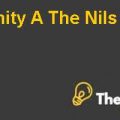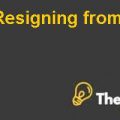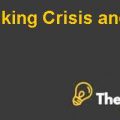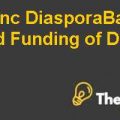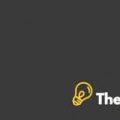ORACLE VS. PEOPLESOFT (A) Case Solution
Seeking Antitrust Review by DOJ:
Department of Justice is required to overlook the anti competitive market activities. Every transaction exceeding $50 million is scrutinized by DOJ and the corporate tended to lobby and tilt the decisions in their favors. The Antitrust policy thoroughly go through the deals and it has the authority to block the investment. This was the risky step of People Soft to go to DOJ, it had several consequences for Oracle. People Soft succeeded in lobbying the DOJ but their share took a hit and it was silver-lining for People Soft as they were not ready to negotiate at share price of $26. This induced Oracle to challenge the verdict of DOJ in Delaware Court, this step could backfire to the People Soft. Oracle had strong argument and ultimately court ruled out the verdict by DOJ and announced decision in the favor of Oracle. This decision pushed People Soft on back foot, my assessment for this step would be going against the decision of board members. It was clear that People Soft was not even negotiating, it was in disadvantage of People Soft and Oracle could dictate the price. By this decision, the board jeopardized the future of the stakeholders and clients.
Issues in Delaware Litigation:
After the judgment by court, Oracle expected to redeem poison pill and customer assurance programs which amounted $2000 million. The central issue of the conference was to justify the actions taken by People Soft to avoid takeover. There has been several cases where poison pill is used as reasonable and justified act in order to avoid takeovers. Although, CAP was just like poison pill which People Soft argued was put in the middle of contract to protect their customers. It posed Oracle with huge liability of $2000 million and it also proved to be reasonable step by People Soft to avoid takeover and protect their customers. The case was tricky and the central issue for the bench of five judges were faced with the decision to keep CAP or redeem the huge liability. The judges were perplexed into deciding that if they found the $2 billion liability reasonable as this was a threat to customers.
Actions of Executives:
The Executives of every firm have unfettered discretion over the takeover defenses actions and takeovers. They are essentially representatives of the shareholders and they are required to work in the best interests to maximize the earnings of the shareholders. The minimum auditing and invisible immunity to the executives often are to disadvantage of the company (Natasha, Jan, & Kristina, 2017). We examine the decisions taken by the executives during Oracle vs People Soft saga.
Craig Conway
Craig Conway was ambitious and confident CEO, he transformed the People Soft into leading firm in enterprise software industry. He played the pivotal role in the growth of People Soft, he felt like he had made People Soft, what it is today. This cognitive bias allowed Conway to make wrong choices. He need did not feel the necessity to consult with the board of directors and he always wore heart on his sleeves. He tried everything to avoid takeover but he was obsessed to not handing over the control to Oracle. Everyone knew Oracle has made reasonable offer and he was obliged to take decisions in the best interests of shareholders rather than his in favor of his personal ego. He disseminated misinformation in the public, when he realized it was inevitable to avoid takeover. He was instrumental in transforming People Soft but during the takeover saga he did not perform his duties accordingly and in the interest of shareholders.
Larry Ellison
The competitive and ruthless nature of Larry Ellison kept Oracle going for the acquisition, although they faced numerous problems in their way. Larry Ellison was lauded as most aggressive and his showmanship has earned him the title of most volatile CEO. His role in the drama of Oracle versus People Soft was to keep aiming for the target. He hates to lose and that’s what he conveyed to his firm that it would be an embarrassing defeat for Oracle to concede after 18 months of long war with People Soft. People Soft included amendment of several bylaws which made the takeover even more expensive but the desire to go against the verdict of Department of Justice was the signal of “Never Give Up” strategy throughout the organization. His spirit and competitiveness aided the process of takeover.
Safra Catz
Safra Catz was the composer of the entire merger and acquisition activities of Oracle. After the decision was taken by Larry Ellison, the task was passed onto the Co-President Catz. She had vast experience of negotiations, mergers and acquisitions. She was touted as successor of Ellison; she did her job at the finest work throughout the whole process. The initial bid was too low, which caused the meltdown in negotiations and caused the conspiracies regarding disrupting the operations of People Soft. Catz and her team held the ground even against the government and she was the one to propose the idea to challenge the decision of Department of Justice in Delaware Court. With the backing of Larry Ellison, she managed to hold the moral grounds and finally took over People Soft.
David Duffield
David Duffield was the pioneer of People Soft and he was the important member of board of directors throughout the process of takeover. Duffield was known for his charitable works and he was also known to be Anti-Ellison. He believed in working together as one family and he served People Soft till 1999, later he retired at the age of 60 years and passing the reigns to Craig Conway. He still owned as much as 8% of total shares in People Soft. He had very little influence during the whole process and his willingness to influence the decisions and advice to Conway were missing during the whole scene. He played very little part in the process of takeover and seemed less concerned and oblivious to take part to stop the takeover................
This is just a sample partical work. Please place the order on the website to get your own originally done case solution.

